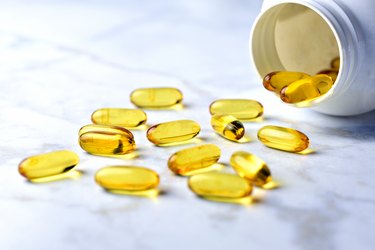
Created by Udo Erasmus, a scientist who has a Ph.D in nutrition, Udo's Oil is a supplement that has a 2:1:1 ratio of omega-3, omega-6 and omega-9 fatty acids. The numbers might sound highly technical, but this simple ratio can have several notable benefits to your overall health and well-being.
As an added benefit for individuals who can't take fish oil for omega-3s, Udo's Oil is free of fish oil.
Video of the Day
Video of the Day
Tip
Udo's Oil contains essential fatty acids that help reduce risk of heart disease and stroke. They also help raise levels of good cholesterol.
Know Your Fats: Udo's Oil
One tablespoon of Udo's Oil contains 120 calories and 14 grams of fat, of which 1.5 grams are saturated, which is about 8 percent of the daily value for saturated fat. The rest of the fat is unsaturated — 9 grams polyunsaturated and 3 grams monounsaturated.
Unsaturated fats can help lower cholesterol levels, which decreases your risk of heart disease, according to Harvard Health Publishing.
Udo's Oil contains 6 grams of omega-3 fatty acids and 3 grams of omega-6 fatty acids and 2.5 grams of omega-9 fatty acids. This 2:1:1 ratio of fatty acids is crucial for good health. Diets high in omega-3 fatty acids and omega-6 fatty acids can contribute to a decreased risk of heart disease, autoimmune diseases.
Omega-9 fatty acids are unsaturated fats that can help lower your levels of unhealthy low-density lipoprotein, the "bad" cholesterol, and raise your high-density lipoprotein, or "good" cholesterol, according to the University of Colorado. That, in turn, can lower your risk of heart disease.
Get Your Essential Fatty Acids
Your body can't make essential fatty acids on its own, which makes them a crucial part of your daily diet. In addition to reducing the risk of certain health problems, essential fatty acids also help repair your cell membranes, which enables them to absorb the nutrients from the foods you eat.
Omega-3 and omega-6 fatty acids promote healthy cell membranes, according to Linus Pauling Institute, which help remove toxins and waste from your body. In addition, fatty acids help your cells communicate with one another so each of your bodily systems works properly.
Fatty fish are a good dietary source of essential fatty acids. Adults should aim to eat at least two servings of these fish per week, according to Mayo Clinic. However, be aware that some types of fish contain high levels of mercury and should be avoided by pregnant or breastfeeding women.
Use Supplements Wisely
Always talk to your doctor before adding supplements such as Udo's Oil to your diet to be sure they're right for you and safe based on your health history. Udo's Oil isn't meant to replace cooking oil; in fact, it can't be heated or used to fry foods.
Instead, Udo's Oil can be taken plain as a nutritional supplement, but you might also drizzle it over cold foods such as tossed and pasta salads.
- FloraHealth.com: "Udo's Choice Ultimate Oil Blend"
- Udo's Choice: "Udo's Choice Ultimate Oil Blend"
- Linus Pauling Institute: "Essential Fatty Acids"
- University of Colorado: "Omega-3, 6, and 9 and How They Add Up"
- Mayo Clinic: "Omega-3 In Fish: How Eating Fish Helps Your Heart"
- Nature: Fatty Acid Molecules: A Role in Cell Signaling